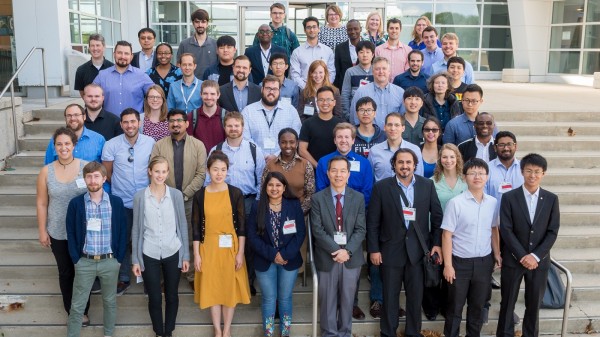Argonne National Laboratory hosted the ninth annual Modeling, Experimentation and Validation summer school in late July. It drew 48 nuclear engineering students from seven countries, including Idaho National Laboratory Graduate Fellow and University of Idaho graduate student Stephen Hancock. Hancock was joined by fellow Vandals Jordan Argyle and Kelley Verner.
By Argonne National Laboratory Staff
Visitors flocked to the U.S. Department of Energy’s Argonne National Laboratory for the ninth annual Modeling, Experimentation and Validation (MeV) Summer School in late July.
The theme of this year’s program was ? Advanced Reactor Systems and Novel Advances in Multi-Physics Modeling and Simulation. The program drew 48 early-career nuclear engineers and scientists from academia and industry, representing seven countries: China, France, Nigeria, South Africa, South Korea, Switzerland and the United States.
Participants studied multiple nuclear reactor designs, including reactors cooled by water, lead, molten sodium salt and gas. The MeV faculty includes more than 60 of the profession’s leaders from U.S. national laboratories, universities, government and business.
There’s really not another forum like this anywhere, said Alex Burja, reactor systems engineer with the U.S. Nuclear Regulatory Commission
MeV is a medium for pre- and postdoc individuals to meet and to hear the latest findings in nuclear science along with a practical, real-world point of view, said Temi Taiwo, program manager in Argonne’s Nuclear Science and Engineering division and a member of the MeV Executive Committee. ? It’s a place for early-career scientists and engineers to exchange ideas, ask questions and learn ‘ and for those of us in the profession to mentor and groom the next generation.
Taek Kim, one of MeV’s three academic deans and manager of Argonne’s Nuclear Systems Analysis group, said the program offers participants unique opportunities to discuss the latest advances across the industry.
Innovation is challenging, Kim said. ? This year’s faculty was a particularly good mix of academia, industry, national laboratories and government regulators. They had the expertise to engage our students.
More than 80 scientists and researchers from 13 countries applied to this year’s program, said Taiwo.
Founded in 2009, MeV is a collaborative effort between Argonne and Idaho National Laboratory, Oak Ridge National Laboratory, the Center for Advanced Energy Studies of the University of Idaho, Idaho State University and the DOE’s Office of Nuclear Energy. Key contributors have included DOE’s Nuclear Science User Facilities and the Gateway for Accelerated Innovation in Nuclear initiative. The three national laboratories take turns hosting MeV; Argonne last hosted the summer program in 2015.
MeV attendees work in teams on assignments based on lecture content around reactor physics, safety and design before presenting their findings on the final day of the school. Those who successfully complete the MeV program can receive graduate credit from Idaho State University.
The program also offers participants valuable networking opportunities. Informal dinner sessions most evenings allow students and mentors to interact in a more relaxed setting. The MeV handbook, which lists student and faculty biographies along with their areas of study, helps participants stay in touch long after the school ends.
MeV Summer School also featured guided tours of Exelon’s Braidwood and LaSalle nuclear power plants; Argonne’s Advanced Photon Source, a DOE Office of Science User Facility; and various facilities in Argonne’s Nuclear Science and Engineering division.
Argonne Principal Nuclear Engineer Nicolas Stauff served this year as a member of the MeV Secretariat and as a mentor to the 2018 participants.
We had excellent students; they were highly qualified and came from very different backgrounds, he said. ? Our faculty members were of the highest caliber, too. They entertained students’ questions and interacted with them well after the lectures ended.
MeV students Alex Burja and April Novak agreed. Burja, a reactor systems engineer with the U.S. Nuclear Regulatory Commission, said MeV offered ? a unique and unparalleled opportunity to hear from the top experts in the profession. There’s really not another forum like this anywhere.
Novak, a doctoral student in nuclear engineering at the University of California, Berkeley, said the MeV experience enabled her to ? put faces to the names of many of the luminaries in her chosen field.
These two weeks also showed us the similarities and differences in how academia and industry work ‘ and gave us an appreciation for all that goes into this profession, she said. ? This has been a broadening experience for me. As we [participants] return to the workplace, we have a bigger picture of the industry. It’s truly exciting to be a part of it.
The DOE Office of Nuclear Energy’s mission is to advance nuclear power to meet the nation’s energy, environmental and national security needs. For more information, visit the Office of Nuclear Energy website.
Argonne National Laboratory seeks solutions to pressing national problems in science and technology. The nation’s first national laboratory, Argonne conducts leading-edge basic and applied scientific research in virtually every scientific discipline. Argonne researchers work closely with researchers from hundreds of companies, universities, and federal, state and municipal agencies to help them solve their specific problems, advance America’s scientific leadership and prepare the nation for a better future. With employees from more than 60 nations, Argonne is managed by UChicago Argonne, LLC for the U.S. Department of Energy’s Office of Science.
The U.S. Department of Energy’s Office of Science is the single largest supporter of basic research in the physical sciences in the United States and is working to address some of the most pressing challenges of our time. For more information, visit the Office of Science website.
Editor’s Note: This story originally appeared on Argonne National Laboratory’s website. It has been republished here with permission from the laboratory.






